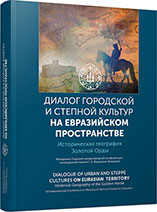Cтратификация игроков политической сцены Дешт-и Кипчака в начале XV века: случай приезда сыновей Тохтамыша в «земли Руси»
Stratification of Political Actors of the Desht-i-Qipchaq in the Beginning of the Fifteenth Century: the Case of the Arrival of Tokhtamysh’s Sons to Muscovy
Author(s): Bulat Raimovich Rakhimzyanov
Subject(s): History, Diplomatic history, Political history, Middle Ages, 15th Century
Published by: Издательский дом Stratum, Университет «Высшая антропологическая школа»
Keywords: Golden Horde; Grand Duchy of Moscow; Jochids; Tatars’ aristocracy in the Muscovian military service;political relations;
Summary/Abstract: This abstract analyses mutual political status of the Golden Horde and Muscovite Grand Principality in the beginning of the fifteenth century. The main goal of abstract is to delineate the real role of Muscovite principality in political history of Central Eurasia in the beginning of the fifteenth century. The author examines the arrival of Tokhtamysh khan’s sons, namely Jelal ad-Din and Kerim-Berdi, to Muscovite principality. Among states that were members of the Golden Horde polity we find so called “Russian ulus” — an alliance of principalities of Northeast Russia, which were conquered by Batu khan. The Moscow Grand Principality became the strongest one among other Russian principalities. It took the leading position in contacts with Tatars. Nevertheless, how influential was the Moscow Grand Principality among other actors in political life of the Desht-i-Qipchaq in the beginning of the fifteenth century? The author concludes that the influence of Moscow was minimal and only began to be seen.
Book: Диалог городской и степной культур на Евразийском пространстве. Историческая география Золотой Орды
- Page Range: 191-194
- Page Count: 4
- Publication Year: 2016
- Language: Russian
- Content File-PDF

